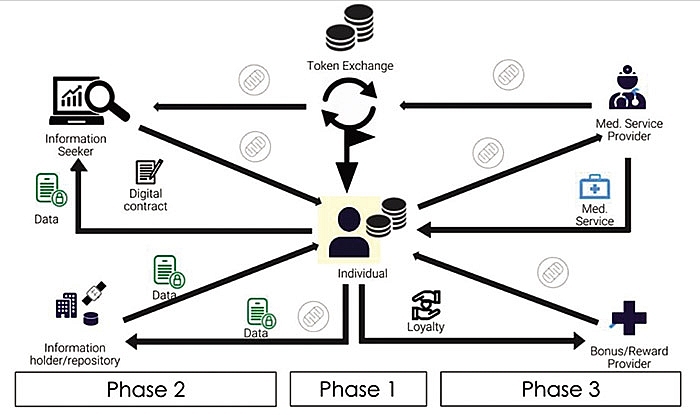Blockchain revolution in healthcare
 |
| By Eberhard Scheuer and Quy Vo-Reinhard HIT Foundation, Switzerland |
According to PwC, which focuses on audit and assurance, tax and consulting services, the global connected health market will be worth $61 billion by 2020 with an annual growth rate of 33 per cent. Meanwhile, according to Transparency Market Research, the global digital health market will be worth $536 billion by 2025.
In a recent survey in Switzerland, 43 per cent of people would be willing to provide personal data to medical research, either for free or for a reduction of their health insurance premium. Over half of the Internet users are willing to share their health data with their health insurers if they receive incentives such as vouchers or premium reductions. In France, 99 per cent of Internet users would be willing to share their personal information if they received cash rewards in return. However, 79 per cent of German online users want the power to decide who can access their health data.
Blockchain in healthcare
A majority of decision-makers in healthcare expect the rapid adoption of blockchain-based applications. More than 80 per cent expect widespread blockchain adoption within five years, with research in the precision medicine field leading the way. Healthcare projects applying blockchain technology are proliferating, and they can be categorised into data infrastructure projects and specific applications. Blockchain in the healthcare market is expected to be valued at $5.61 billion by 2025 with a compounded annual growth rate (CAGR) of 63.9 per cent from $176.8 million in 2018.
Recently, there is a rising number of projects in the healthcare area that apply permission-based blockchain and execute centralised business models that do not necessarily need a blockchain. Moreover, some claim to put medical data on a blockchain violates the central pillar of data protection laws, which is the right to be forgotten. It is the very nature of a blockchain that it is immutable and persistent. We have to be aware that every transaction is stamped and recorded. Nevertheless, if implemented properly, this can be very useful in medical research.
Blockchain-based contracts have the potential to reduce transaction costs dramatically when transactions are triggered once certain prerequisites are fulfilled. Smart contracts can be understood as software agents, which act deterministically and autonomously, within the scope of a given network, according to a predefined rule set.
As a unit in Switzerland offering a decentralised marketplace that matches people seeking health information with those who provide it, Health Information Traceability (HIT) Foundation has used blockchain to seek to address three key issues plaguing healthcare. The first is monopolisation of health data leading to siloes and inefficiencies. The second is the lack of incentives for individuals to demand or record, digitise, and update their health data. The final factor is data privacy. HIT offers to put the individual in the centre of care. It is through the individual and the use of blockchain technology that a meaningful exchange of data can take place in a fair, secure, and transparent manner.
Thanks to the appliance of blockchain in healthcare, researchers have direct access to potential study participants by searching their metadata that match the inclusion criteria; patient-generated health data on-demand; electronic informed consent; audit trails for the research data. These data cannot be altered or manipulated.
Furthermore, insurers and industries get patient-reported outcome data to control the effectiveness of treatments and hence the reimbursement of the treatment. Additionally, all health data that is being generated without individuals’ knowledge and consent by connected devices is tracked.
Therefore, a dramatic reduction of administrative time and costs can be achieved. Privacy can be maintained, which is very important to those whose health data may be of stigmatising nature, such as HIV or mental health issues.
Health data tokenisation is the key towards a sustainable future of health, and such strategy and approaches are the key success factors for sustainable development.
 |
Applying blockchain in Vietnam’s healthcare system
Vietnam is the next growing healthcare market in the ASEAN bloc due to a large population, rapid urbanisation, and increasing demands for quality healthcare. The average income of the middle-class population in Vietnam increased in recent years, which will lead the growth of the country’s healthcare market.
Vietnam may become a research and development, vaccine development, and generic drugs manufacturing hub in the region due to low-cost production and a competitive environment. IT infrastructure development, collaboration with public and private hospitals, aged care services, and demand for private, affordable healthcare services are growing sectors in Vietnam. CAGR is forecasted to increase up to 13.4 per cent by 2020. By 2020, health insurance will cover more than 84 per cent of the population by the government to make it accessible and affordable to everyone.
However, the current healthcare system in Vietnam has to deal with a lack of interoperability, incentives, and privacy for the individual. Tremendous amounts of data are generated by medical documentation, regulatory requirements, and patient care. Data, especially health data, has become a new currency of the future. The reality is that very often this data cannot be shared due to a lack of interoperability as it is being stored in one application or in a non-standardised format that cannot be utilised by other applications. In many cases in Vietnam, this still refers to paper, although it is acknowledged that digitally sharing data can save lots of money.
Therefore, a decentralised market place without a central database like HIT Foundation is an ideal platform to meet the needs of the Vietnamese healthcare system. It provides the incentives for the citizen to use it and help the Ministry of Health to meet their targets. Each Vietnamese citizen will have an anonymous electronic medical record, and data with real value that they can exchange for healthcare or non-healthcare services.
HIT Foundation has invested a five-figure amount in dollars so far, but will invest much larger sums depending on the success of the pilot projects. Since the middle of last year, HIT Foundation has been in partnership with several hospitals and partners in Vietnam. For example, in the tuberculosis programme, HIT Platform is used as an incentive for patients to follow adherence treatment. Reward tokens can be redeemed in medicine, community support, and other healthcare services. At the National Hospital of Tropical Diseases, HIT Foundation aim to incentivise patients to digitalise their health data and the rewarded tokens can be used in the loyalty programme or for priority appointments.
As we do in airlines and other industries, it is the right time for the healthcare industry in Vietnam to participate fully in digital transformation and Industry 4.0.
What the stars mean:
★ Poor ★ ★ Promising ★★★ Good ★★★★ Very good ★★★★★ Exceptional
Related Contents
Latest News
More News
- Vietnamese consumers express concern about climate change (October 11, 2025 | 14:06)
- ESG seen as key to Vietnam’s business credibility and capital attraction (September 29, 2025 | 18:38)
- From compliance to strategy: ESG criteria gaining ground (September 29, 2025 | 15:47)
- Vietnamese firms step up ESG game (September 23, 2025 | 15:26)
- Vietnam tax and legal changes set to shape foreign investment landscape (September 16, 2025 | 13:46)
- Vietnamese businesses navigate US tariffs (June 25, 2025 | 12:14)
- The impact of cloud, AI, and data on financial services (April 14, 2025 | 11:20)
- Vietnam 2025 M&A outlook: trends, deals, and opportunities (March 21, 2025 | 08:54)
- Vietnam's M&A landscape mirrors global trends (February 18, 2025 | 17:13)
- Asia-Pacific CEOs enter 2025 with optimism and caution (February 06, 2025 | 17:16)

 Tag:
Tag:




















 Mobile Version
Mobile Version